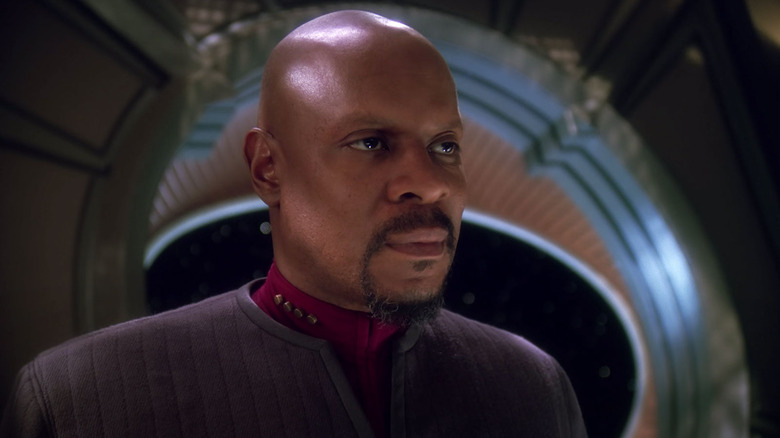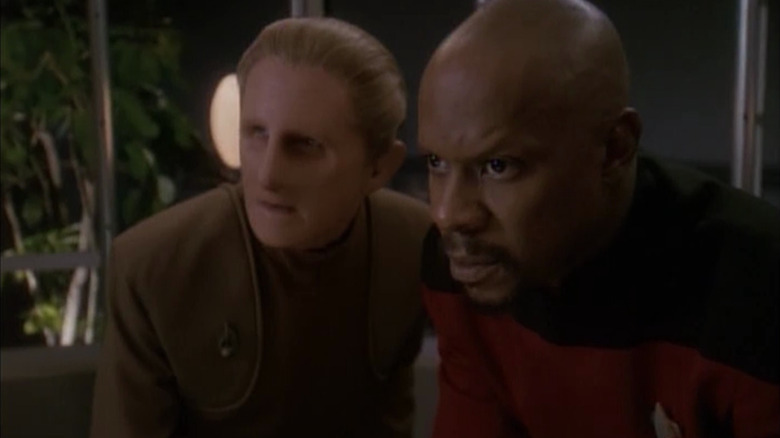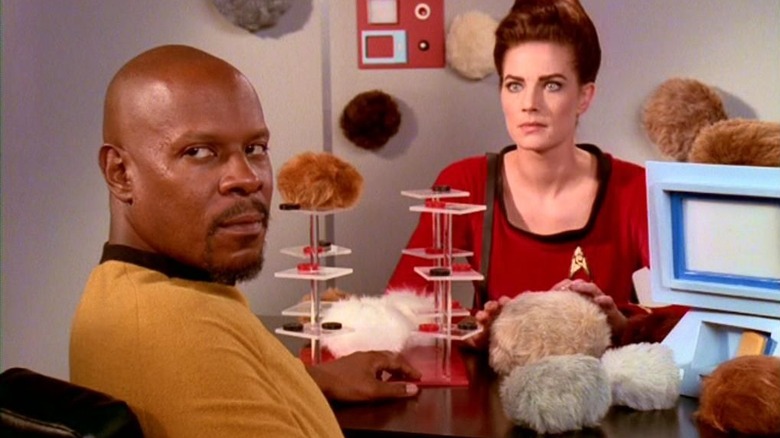Why One Star Trek Writer Initially Considered Sisko A 'Tragic Mistake' For DS9
First introduced in 1993, Captain Benjamin Sisko (Avery Brooks) was a very different type of character than Trekkies had previously seen. Unlike the affable Captain Kirk (William Shatner) or the professorial Captain Picard (Patrick Stewart), Sisko was a bitter commanding officer. He had lost his wife in a Borg attack, and approached the world with an element of resentment, unwilling to suffer nonsense and appreciative of straight talk. Sisko could be warm, especially with his teenage son Jake (Cirroc Lofton), but more generally wanted to get down to brass tacks. More than Kirk and Picard, Sisko was emotional and passionate and possessed of a temper; when the trickster god Q (John De Lanice) first appeared on "Star Trek: Deep Space Nine," Sisko punched him in the face.
Sisko's character matched his assignment. On "DS9," he was placed in charge of a Cardassian space station that had been abandoned after a prolonged and bloody military occupation of the planet Bajor. The Bajorans inherited the station and entered a delicate period of political reconstruction. Starfleet was called in to facilitate. Because of the damage to Bajor and the dangerous power vacuum it created, Sisko had a lot to do.
For the first two seasons of "Deep Space Nine," Sisko bore the rank of Commander. It wouldn't be until "The Adversary" (June 19, 1995) that he would finally become a Captain. Why start at the lower rank? It seems that the character conception for Sisko was quite different from what he would become, and adhering to that conception was something "Deep Space Nine" showrunner Ira Steven Behr considered a grave tragedy.
Behr discussed it in the oral history book "The Fifty-Year Mission: The Next 25 Years: From The Next Generation to J. J. Abrams," edited by Mark A. Altman and Edward Gross.
Behr thought making Sisko a Commander was one of the show's 'tragic mistakes'
Behr recalled that, while "Deep Space Nine" was still being developed, Sisko was meant to be a younger character, less experienced and more impulsive. His rank of commander was meant to reflect an element of immaturity — a notion that Sisko hadn't yet fully reached career adulthood, as it were. Had the makers of "DS9" cast a younger actor, perhaps it would have worked, but star Avery Brooks was already around 44 when the show began shooting. The "young hothead" archetype didn't really fit the actor, nor the maturity level of the series. But, perhaps through mere created stubbornness, Sisko remained constitutionally young. Behr said:
"Making Sisko a commander is one of the tragic mistakes of DS9. I'm sure it seemed like a good idea at the time, but what a mistake. To the fans, the hero of Star Trek is the captain, and if you're not a captain, there's got to be something wrong with you. You're the star of the show and you're not a captain and you're a man already in your forties? If he would have been in his early thirties, like they had said he was going to be, it would have been a different matter. Avery didn't give off that youthful feeling."
It seems like several showrunners wanted to have their cake and eat it too with Sisko. They wanted someone young, defeated, and impulsive, but they also wanted him to be the father of a teenager and capable enough to command a space station with ongoing problems, as well as oversee the reconstruction of an entire world. Was he a neophyte or a diplomat? Sisko certainly grew over the course of the series, but he started from a more advanced place than some producers initially envisioned.
'Boy, this isn't what we thought'
A big reason for the shift in Sisko's maturity boiled down to Avery Brooks. As Behr mentioned, the actor didn't project youthfulness and inexperience. Brooks already had a long career in TV, having appeared on the 1985 TV series "Spenser: For Hire" and having starred in the 1989 spinoff "A Man Called Hawk." Brooks has also appeared on stage throughout his career, to sing and to act, and possesses a master of fine arts and directing degree from Rutgers. (He was the first Black man to achieve that honor from that university.) Brooks is a man with authority and maturity. While he may be able to play quiet and inexperienced characters, by age 44, that was no longer his natural note as a performer.
Behr and one of the show's head writers, Peter Alla Fields, took one look at Brooks and knew that things needed to change. Behr said:
"I remember when they told us they were going to cast Avery, Pete and I looked at the audition tape, which I think I still have somewhere, and said, 'Boy, this isn't what we thought. Why is he a commander? What happened to the younger guy who was going to have all these doubts and feelings of defeat?'"
Know that no "Star Trek" show starts at its strongest, and most of them don't hit a stride until maybe their third season. That was certainly the case with "Deep Space Nine," which experienced a few growing pains but finally hit a groove sometime in 1995. At the same time, Sisko was finally promoted to captain. It took a little while, but all became right with the world. Sisko remained a captain until the final episode of the show, where he ascended and became an incorporeal semi-deity.
"Deep Space Nine" was wild.


